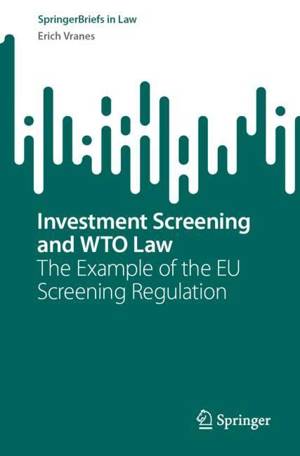
Je cadeautjes zeker op tijd in huis hebben voor de feestdagen? Kom langs in onze winkels en vind het perfecte geschenk!
- Afhalen na 1 uur in een winkel met voorraad
- Gratis thuislevering in België vanaf € 30
- Ruim aanbod met 7 miljoen producten
Je cadeautjes zeker op tijd in huis hebben voor de feestdagen? Kom langs in onze winkels en vind het perfecte geschenk!
- Afhalen na 1 uur in een winkel met voorraad
- Gratis thuislevering in België vanaf € 30
- Ruim aanbod met 7 miljoen producten
Zoeken
€ 76,45
+ 152 punten
Omschrijving
In recent years, there has been a worldwide intensification in the use of investment screening mechanisms. This surge is connected with political re-orientations, the rise of new economic powers, and security concerns. Despite the considerable effects that investment screening may have on international investment and trade, there is hardly any literature examining the consequences to be drawn from relevant WTO rules for investment screening. However, the importance of WTO law for such instruments is substantial not least due to the broad scopes of application of the GATT and GATS agreements. The risk that screening activities could be challenged before the WTO is underlined by pertinent panel reports. This book in particular uses the 2019 EU Screening Regulation as an example for illustrating the relevance that WTO law has for investment screening. It concludes that in the light of relevant WTO rulings screening activities undertaken for public order and security reasons may face considerable hurdles not least in the general exceptions and security exceptions of the GATT and the GATS.
Specificaties
Betrokkenen
- Auteur(s):
- Uitgeverij:
Inhoud
- Aantal bladzijden:
- 73
- Taal:
- Engels
- Reeks:
Eigenschappen
- Productcode (EAN):
- 9783031467233
- Verschijningsdatum:
- 11/11/2023
- Uitvoering:
- Paperback
- Formaat:
- Trade paperback (VS)
- Afmetingen:
- 156 mm x 234 mm
- Gewicht:
- 122 g

Alleen bij Standaard Boekhandel
+ 152 punten op je klantenkaart van Standaard Boekhandel
Beoordelingen
We publiceren alleen reviews die voldoen aan de voorwaarden voor reviews. Bekijk onze voorwaarden voor reviews.









